The Pact of Umar, 9th Century AD
The Treaty of Umar is the body of
limitations and privileges entered into by treaty between conquering
Muslims and conquered non-Muslims. We have no special treaty of this
sort with the Jews, but we must assume that all conquered peoples,
including the Jews, had to subscribe to it. Thus the laws cited
below and directed against churches apply to synagogues too. The
Treaty was probably originated about 637 by Umar I after the
conquest of Christian Syria and Palestine. By accretions from
established practices and precedents, the Treaty was extended; yet
despite these additions the whole Treaty was ascribed to Umar. There are many
variants of the text and scholars deny that the text as it now
stands could have come from the pen of Umar I; it is generally
assumed that its present form dates from about the ninth century. The Treaty of Umar has served to govern the relations between the
Muslims and "the people of the book," such as Jews, Christians, and
the like, down to the present day. In addition to the conditions of the Treaty listed below, the Jews,
like the Christians, paid a head-tax in return for protection, and
for exemption from military service. Jews and Christians were also
forbidden to hold government office. This Treaty, like much
medieval legislation, was honoured more in the breach than in the
observance. In general, though, the Treaty increased in stringency
with the centuries and was still in force in the 20th century in
lands such as Yemen.
A writing to Umar from the Christians
"In the name of God, the Merciful, the Compassionate!
"When You [Muslims] marched against us
[Christians],: we asked of you protection for ourselves, our
posterity, our possessions, and our co-religionists; and we made
this stipulation with you, that we will not erect in our city or the
suburbs any new monastery, church, cell or hermitage; that we will
not repair any of such buildings that may fall into ruins, or renew
those that may be situated in the Muslim quarters of the town; that
we will not refuse the Muslims entry into our churches either by
night or by day; that we will open the gates wide to passengers and
travellers; that we will receive any Muslim traveller into our
houses and give him food and lodging for three nights; that we will
not harbour any spy in our churches or houses, or conceal any enemy
of the Muslims. That we will not teach our children the Qu'ran; that we will not make a
show of the Christian religion nor invite any one to embrace it;
that we will not prevent any of our kinsmen from embracing Islam, if
they so desire. That we will honour the
Muslims and rise up in our assemblies when they wish to take their
seats; that we will not imitate them in our dress, either in the
cap, turban, sandals, or parting of the hair; that we will not make
use of their expressions of speech, nor adopt their surnames
[infidels must not use greetings and special phrases employed only
by Muslims]; that we will not ride on saddles, or gird on swords, or
take to ourselves arms or wear them, or engrave Arabic inscriptions
on our rings; that we will not sell wine;
that we will shave the front of our heads; that we will keep to our
own style of dress, wherever we may be; that we will wear girdles
round our waists [infidels wore leather or cord girdles; Muslims,
cloth and silk]. That we will not display the cross upon our churches or display our
crosses or our sacred books in the streets of the Muslims, or in
their market-places; that we will strike the clappers in our
churches lightly; that we will not recite our services in a loud
voice when a Muslim is present; that we will not carry Palm branches
[on Palm Sunday] or our images in procession in the streets; that at
the burial of our dead we will not chant loudly or carry lighted
candles in the streets of the Muslims or their market places; that
we will not take any slaves that have already been in the possession
of Muslims, nor spy into their houses; and that we will not strike
any Muslim. All this we promise to observe, on behalf of ourselves and our
co-religionists, and receive protection from you in exchange; and if
we violate any of the conditions of this agreement, then we forfeit
your protection and you are at liberty to treat us as enemies and
rebels." - Jacob Marcus, in "The Jew in the Medieval World",
1938.
The Future of Europe
For Europe will be under Islamic Rule for less than 29 years. The
First Country to be under its rule will be France, first by
moderate, then by the radical ones who shall take over. Sweden shall
be next, followed by Germany and Spain. Iran shall attack the
southern parts of Spain. A great leader shall arise from the
northern African territories of the Blue Turban, he shall start,
then after his passing the White Turban leader will continue to war.
America shall come to war for Greenland shall come under Islamic
Rule, so do the Northern Territories of Australia facing Indonesia.
Gibraltar shall be taken several times, and then repelled several
times. Monaco shall be invaded, chosen as an easy way to gain
entrance. The Vatican to Canada shall go. Nature will decisively end
the war. Civilization shall retrocede 100 years. Much of the land
mass of Europe will submerge. Communist China will invade Taiwan,
North America, and the world will not move a finger, but the
unelected Chinese Communist Regime by doing so, will sow
unknowingly, the seeds of its downfall in the long term. And the
lands of China will be free from the Communist Plague. The United
States shall be ruled by a Communist home grown system. Australia
will never be under Islamic Rule. A volcano will destroy Byzantium,
its light at night shall be seen from Greece.
Civilization of Modern
Europe might fall, as fell the civilization of Ancient Rome
“How dreadful are the curses which Mohammedanism lays on its
votaries! Besides the fanatical frenzy, which is as dangerous in a
man as hydrophobia in a dog, there is this fearful fatalistic
apathy. The effects are apparent in many countries, improvident
habits, slovenly systems of agriculture, sluggish methods of
commerce, and insecurity of property exist wherever the followers of
the Prophet rule or live.
A degraded sensualism deprives this life of its grace and
refinement, the next of its dignity and sanctity. The fact that in
Mohammedan law every woman must belong to some man as his absolute
property, either as a child, a wife, or a concubine, must delay the
final extinction of slavery until the faith of Islam has ceased to
be a great power among men.
Individual Moslems may show splendid qualities. Thousands become the
brave and loyal soldiers of the Queen, all know how to die; but the
influence of the religion paralyses the social development of those
who follow it. No stronger retrograde force exists in the world. Far
from being moribund, Mohammedanism is a militant and proselytizing
faith.
It has already spread throughout Central Africa, raising fearless
warriors at every step; and were it not that Christianity is
sheltered in the strong arms of science, the science against which
it had vainly struggled, the civilization of modern Europe might
fall, as fell the civilization of ancient Rome.” - Winston S.
Churchill, in “The River War”, 1899
“Indeed it is evident that Christianity, however degraded and
distorted by cruelty and intolerance, must always exert a modifying
influence on men’s passions, and protect them from the more violent
forms of fanatical fever, as we are protected from smallpox by
vaccination. But the Mahommedan religion increases, instead of
lessening, the fury of intolerance.
It was originally propagated by the sword, and ever since its
votaries have been subject, above the people of all other creeds, to
this form of madness. In a moment the fruits of patient toil, the
prospects of material prosperity, the fear of death itself, are
flung aside.
The more emotional Pathans are powerless to resist. All rational
considerations are forgotten. Seizing their weapons, they become
Ghazis, as dangerous and as sensible as mad dogs: fit only to be
treated as such. While the more generous spirits among the tribesmen
become convulsed in an ecstasy of religious bloodthirstiness, poorer
and more material souls derive additional impulses from the
influence of others, the hopes of plunder and the joy of fighting.
Thus whole nations are roused to arms. Thus the Turks repel their
enemies, the Arabs of the Sudan break the British squares, and the
rising on the Indian frontier spreads far and wide.
In each case civilisation is confronted with militant Mahommedanism.
The forces of progress clash with those of reaction. The religion of
blood and war is face to face with that of peace. Luckily the
religion of peace is usually the better armed.” - Winston S.
Churchill, in “The Story of the Malakand Field Force”, 1898
The Qur'an: A Complete Revelation by Sam Gerrans (PDF)
What is Islam?
Islam is a cultural, religious and political system. Only the
political system is of interest to kafirs (non-Muslims) since it
determines how we are defined and treated. The Islamic political
system is contained in the Koran, the Hadith (the traditions of
Mohammed) and his biography, the Sira.
The Five Principles
Islam’s Trilogy of three sacred
texts is the Koran and two books about the life of Mohammed. When
the Trilogy is sorted, categorized, arranged, rewritten and
analyzed, it becomes apparent that five principles are the
foundation of Islam.
All of Islam is based upon the
Trilogy: Koran,
Sira (Mohammed’s biography) and
Hadith (his Traditions).
Most of the Islamic doctrine is political, not religious. Islam is a
political ideology.
Islam divides the world into
Muslims and unbelievers, kafirs.
Political Islam always has two
different ways to treat kafirs: dualistic ethics. Kafirs can be
abused in the worst ways or they can be treated like a good
neighbour.
Kafirs must submit to Islam in all
politics and public life. Every aspect of kafir civilization must
submit to political Islam.
These Five Principles can be put in
five words—Trilogy, politics, kafirs, dualism and submission. These
five words bring clarity and ease of learning about political Islam.
Up until now Islam has been hard to
understand because it seemed complex and contradictory and did not
make sense. But, once you see how the Five Principles work,
everything falls into place. Complexity becomes simplicity. Chaos
becomes order.
All Center for the Study of
Political Islam (CSPI) books are based on these 5 Principles.
1. Trilogy
The Trilogy contains 3 books:
The
Koran is what Mohammed
said that the angel Gabriel said that Allah said. But the
Koran
does not contain enough guidance for one to be a Muslim. The
Koran repeatedly says that all of the world should imitate
Mohammed in every way. Mohammed’s words and deeds are called the
Sunna. The Sunna is found in 2 different texts: the
Sira
and Hadith. The first source of the Sunna is
the Sira which is Mohammed’s biography. The most
authoritative version is by Ibn Ishaq. The other source of the Sunna is
the Hadith, the Traditions of Mohammed. There are several
versions of Hadith, but the most commonly used is by
Bukhari. So the Trilogy is: the Koran,
Sira and
Hadith.
2. Political Islam
Political Islam is the doctrine
that relates to the unbeliever, the kafir. Islam’s relationship to
the kafir cannot be religious since a Muslim is strictly forbidden
to have any religious interaction with them The religion of Islam is
what is required for a Muslim to avoid Hell and enter Paradise. The Trilogy not only advocates a
religious superiority over the kafir—the kafirs go to Hell whereas
Muslims go to Paradise—but also its doctrine demands that Muslims
dominate the kafir in all politics and culture. This domination is
political, not religious. As mentioned the Koran has
61% of its text devoted to the kafir. The Sira (Mohammed’s
biography) has about 75% of its text devoted to the kafir and jihad. Islam’s success comes primarily
from its politics. In thirteen years as a spiritual leader, Mohammed
converted 150 people to his religion. When he became a political
leader and warrior, Islam exploded in growth, and Mohammed became
king of Arabia in ten years. Islam has a complete doctrine of
how to treat the kafir that is found in the Trilogy.
3. Kafirs
Non-believers are so important that
they have several names. Christians and Jews are called People of
the Book or infidels. Other religious names for non-Muslims are
atheist, polytheist, and pagan. But the Koran uses one word that
includes all of the religious names. That name is kafir, an Arabic
word. Kafir is usually translated as
unbeliever, but that translation is wrong. Unbeliever is a neutral
word. The Koran is very clear about the kafir. Indeed, the
Koran defines the kafir by how it speaks of them. Kafirs
are the lowest and worst form of life. Kafirs can be robbed,
murdered, tortured, enslaved, crucified and more. Later in this
chapter, more of the Koran’s doctrine of the kafir is given
in some detail. But the key point is that a kafir is not only a
non-Muslim, but also a person who falls under a different moral code
from the Muslim. The Koran is devoted to
the division between those who believe Mohammed, Muslims, and those
who do not, kafirs. This grand division of the
Koran means
that there are two points of view of the
Koran—the view of
the Muslim and the view of the kafir.
4. Dualism
The third principle is duality, and
is unique to Islam. As an example, here is a verse from the Koran:
"I do not worship what you
worship, and you do not worship what I worship. I will never
worship what you worship, and you will never worship what I
worship. You to your religion, me to my religion." - 109:2
This sounds very tolerant, but this
verse was written later:
"When the sacred months are
passed, kill the kafirs wherever you find them. Take them as
captives, besiege them, and lie in wait for them with every kind
of ambush. If they submit to Islam, observe prayer, and pay the
poor tax, then let them go their way. Allah is gracious and
merciful." - 9:5
Now we have absolute intolerance.
This contradiction is normal for the Koran and is even
addressed in the Koran. The solution to contradiction is
called abrogation where the later verse is better than the earlier
verse. The logic here is very important.
Since Allah is perfect and the Koran is the exact words of
Allah, then both contradictory verses are true, but the later verse
is better or stronger. This leads to dualistic logic where two
contradictory facts can both be true.
5. Submission
Islam means submission and Muslim
means one who has submitted. It is clearly stated in the Trilogy
that all kafirs and their civilizations must be annihilated.
Mohammed’s success depended on violence to persuade kafirs that he
was the prophet of Allah. Submission is political, as well as
religious. Islam demands that kafirs submit in every aspect of
public life. Every part of kafir culture is an offense to Allah.
Authoritative
There are only two ultimate
authorities about Islam: Allah and Mohammed. Allah is found in the
Koran. Mohammed is found in the Sira (Mohammed’s biography) and in
the Hadith (his words and actions).
Systemic Knowledge
The easiest way to study Islam is to
see the whole picture. For instance, the Koran alone cannot be
understood due to a lack of context, but when the life of Mohammed
is added, it makes sense.
Political Islam, Not Religious
Islam
Islam has a political doctrine and a religious doctrine. Its
political doctrine concerns everyone, while religious Islam only
concerns Muslims.
Kafir
The language of Islam is dualistic. As
an example, there is never any reference to humanity as a unified
whole. Instead there is a division into believer and kafir
(unbeliever). Humanity is not seen as one body, but is divided into
whether the person believes Mohammed is the prophet of Allah or not.
Kafir is what the Koran and Islam call the unbelievers. Kafir is the
worst word in the human language.
The Koran defines the kafir and says that the kafir is:
Hated: "They who dispute the signs of Allah [kafirs] without
authority having reached them are greatly hated by Allah and the
believers. So Allah seals up every arrogant, disdainful heart. and
despised by Allah." - 40:35
Mocked: "On that day the faithful will mock the kafirs, while
they sit on bridal couches and watch them. Should not the kafirs be
paid back for what they did?" - 83:34
Punished: "Say to the kafirs: My Lord does not care for you or
your prayers. You have rejected the truth, so sooner or later, a
punishment will come." - 25:77
Beheaded: "When you encounter the kafirs on the battlefield, cut
off their heads until you have thor-oughly defeated them and then
take the prisoners and tie them up firmly." - 47:4
Confused: "Some among them listen to you [Mohammed], but We have
cast veils over their [kafirs] hearts and a heaviness to their ears
so that they cannot understand our signs [the Koran]." - 6:25
Plotted against: "They plot and scheme against you [Mohammed],
and I plot and scheme against them. Therefore, deal calmly with the kafirs and leave them alone for a while."
- 86:15
Terrorized: "Then your Lord spoke to His angels and said, “I
will be with you. Give strength to the believers. I will send terror
into the kafirs’ hearts, cut off their heads and even the tips of
their fingers!”- 8:12
Annihilated: "So the kafirs were annihilated. All praise be to
Allah, the Lord of the worlds." - 6:45
Killed: "If they do not keep away from you or offer you peace or
withdraw their hostilities, then seize them and kill them wherever
they are. We give you complete authority over them." - 4:91
Crucified: "The only reward for those who war against Allah and
His messengers and strive to com-mit mischief on the earth is that
they will be slain or crucified, have their alternate hands and feet
cut off, or be banished from the land. This will be their disgrace
in this world, and a great torment shall be theirs in the next
except those who repent before you overpower them. Know that Allah
is forgiving and merciful." - 5:33
Made war on: "Make war on those who have received the Scriptures
[Jews and Christians] but do not believe in Allah or in the Last
Day. They do not forbid what Allah and His Messenger have forbidden.
The Christians and Jews do not follow the religion of truth until
they submit and pay the poll tax [jizya], and they are humiliated."
- 9:29
A Muslim is not the friend of a kafir: "Believers should not
take kafirs as friends in preference to other believers. Those who
do this will have none of Allah’s protection and will only have
themselves as guards. Allah warns you to fear Him for all will
return to Him." - 3:28
A kafir is ignorant: "Even if We had sent down the angels to
them [kafirs], the dead had spoken to them, and We had gathered all
things before their eyes, they would not believe unless Allah had
willed it, but most of them are ignorant." - 6:111
Evil: "And say: Oh my Lord! I seek refuge with You from the
suggestions of the evil ones [kafirs]. And I seek refuge with you,
my Lord, from their presence." - 23:97
Disgraced: "Tell them, “Yes! And you [kafirs] will be
disgraced.” a partner of Satan 25:55 And still they worship others
besides Allah who can neither help nor hurt them. The kafir is
Satan’s ally against Allah. Unclean- 9:28 Oh, believers, only the
kafirs are unclean." - 37:18
Cursed: "They [kafirs] will be cursed, and wherever they are
found, they will be seized and mur-dered. It was Allah’s same
practice with those who came before them, and you will find no
change in Allah’s ways." - 33:60
Stolen from: "On the day of Khaybar, Allah’s Apostle
divided the spoils of war of Khaybar with the ratio of two shares
for the horse and one share for the foot soldier." - Bukhari 5, 59, 537
Raped: "On the occasion of Khaybar, Mohammed put forth new orders about forcing sex with
captive women. If the woman was pregnant she was not to be used for
sex until after the birth of the child. Nor were any women to be
used for sex who were unclean with regard to Muslim laws about
menstruation." - Ishaq 759 [Mohammed’s official biography]
The word “kafir”
Christians and Jews are infidels, but infidels are kafirs, too.
Polytheists are Hindus, but they are also kafirs. The terms infidel
and polytheist are religious words. Only the word “kafir” shows the
common political treatment of Christian, Jew, Hindu, Buddhist,
animist, atheist and humanist.
The word kafir should be used instead of “unbeliever”, the standard
word. Unbeliever is a neutral term. The Koran defines the kafir and
kafir is not a neutral word. A kafir is not merely someone who does
not agree with Islam, but a kafir is evil, disgusting, the lowest
form of life. Kafirs can be tortured, killed, lied to and cheated.
So the usual word “unbeliever” does not reflect the political
reality of Islam.
The 13 Verses that tell the Muslim not to be friend of a Kafir
(PDF) The Political
Traditions of Mohammed: The Hadith for the Unbelievers
According to Allah, the words and
deeds of Mohammed form the perfect pattern for all Muslims to
follow. Mohammed’s speech and actions are recorded in the the Hadith,
also called the Traditions. The Hadith are more important in the
daily practice and world-view of a Muslim than the Koran. Without
the Hadith, there can be no Islam. In the Hadith, every subject, great
or small, is covered–ethics, jihad, sex, slavery, art and everyday
habits are all described in great detail. The Hadith contain all of
the tactical aspects of jihad. Jihad is neither a blind fury nor a
hatred for the non-Muslim, but is a sacred act to prepare the world
for Islam. Jihad is demanded for all Muslims and is the sixth pillar
of Islam.
The Hadith are a tactical manual of Islamic politics and are a key
to understanding Islam.
The Islamic Trilogy: Koran, Sira, Hadith
Islam is a political system, a culture and a religion based upon the
Koran, Sira (life of Mohammed) and Hadith (the Traditions). The Islamic Trilogy series
integrates the three primary texts to reveal the entire Islamic
political doctrine of the treatment of non-Muslims. The Trilogy is authoritative and
fact-based. All content can be confirmed by the use of reference
numbers in the primary source documents. All of the primary sources
are used to give the complete picture of Islam’s political doctrine.
Please Read The Political Traditions of
Mohammed and learn about Islam from its source
Lessons on Political Islam - level 2 (PDF)
The Relative Sizes of the Trilogy
Texts
Koran: 152,006 words. (Note: this
count will differ with each translation)
Hadith: Bukhari has 645,745 words.
Sira: the Sira has three divisions.
There is Mohammed’s life as a prophet and auxiliary material that
precedes his prophet-ship and events following his death. The third
element is Hisham’s notes. We have a precise word count for
Mohammed’s prophet-hood from a scanned version of Guillaume’s
The Life of the Muhammad. It covers 579 pages and has a word
count of 274,838 words. Since the material from his actual life as a
prophet is Sunna, we only use the prophet material.
Total of Koran, Sira (without Sira
extras) and Hadith: 1,072,589 words.
As a technical note: if we include
the auxiliary material and Hisham, the total word count is estimated
to be: 379,700 words.
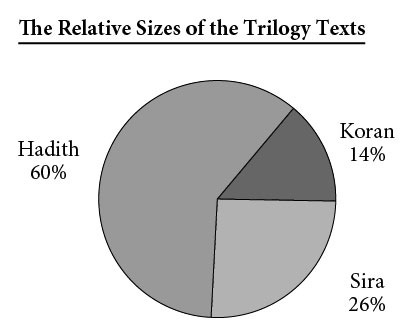
| Word Count |
152,006 |
274,838 |
645,745 |
Fraction of
Total
1,072,589 words |
14% |
26% |
60% |
Books
Koran Text
(PDF)
Sira Text (PDF)
Hadith Text
(PDF)
Kafirs in the Trilogy
Islam devotes a great amount of energy to the Kafir. The majority
(64%) of the Koran is devoted to the Kafir, and nearly all of the
Sira (81%) deals with Mohammed’s struggle with them. The Hadith
(Traditions) devotes 37% of the text to Kafirs. Overall, the Trilogy
devotes 51% of its content to the Kafir.
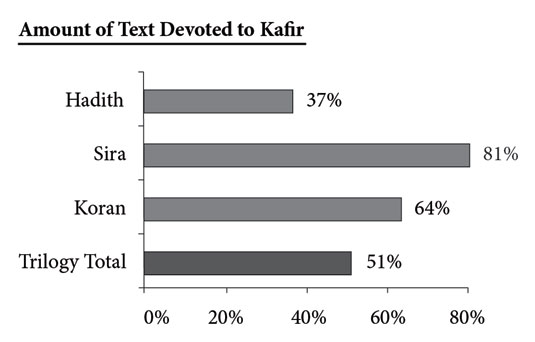
|
Jews |
57,563 |
8.9% |
|
Jihad |
132,315 |
21% |
|
Christians |
18,137 |
2.8% |
|
Pagans |
30,260 |
4.7% |
|
Total Kafir in Hadith |
238,275 |
36.9% |
|
|
|
|
|
Hadith/Bukhari |
645,745 |
|
|
Sira (prophet) |
274,838 |
|
|
Koran |
152,006 |
|
|
Total Trilogy |
1,072,589 |
|
|
|
|
|
|
Meccan Koran |
66,285 |
68.2% |
|
Medinan Koran |
31,287 |
57% |
|
Total Koran |
97,583 |
64% |
|
Sira |
221,343 |
81% |
|
Hadith Kafir material |
238,275 |
36.9% |
|
|
|
|
|
Total Words |
548,190 |
51% |
| Grand
totals: Kafir / Trilogy = 548,190 / 1,072,589 = 51% |
Kafirs in the Meccan Koran (PDF)
Kafirs in the Medinan Koran (PDF)
Kafirs in the Sira (PDF)
Kafir in the Hadith
has 4 components: Jews, Jihad, Christians, Pagans
Jews
in Hadith (PDF)
Jihad in Hadith (PDF)
Christian in Hadith (PDF)
Pagans in Hadith (PDF)
Amount of Text in the Sira
The Sira text devoted to Mohammed’s prophecy is the active part of
the text.
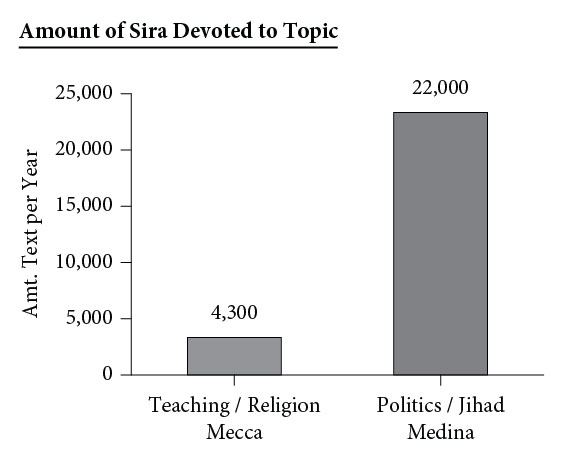
| Mecca |
55,336 |
13 |
4,257 |
| Medina |
219,469 |
10 |
21,947 |
| Ratio: 5.2% |
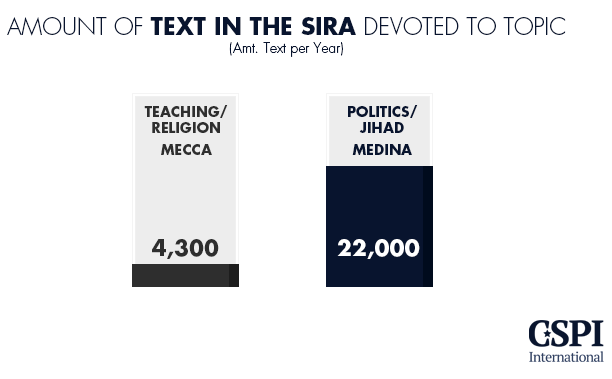
Amount of text in the Sira
(biography of Mohammed) devoted to religious preaching in Mecca 13
years, and political activity in Medina 10 years.
Sira
Prophecy (PDF)
Anti-Jew Text in Trilogy
The Trilogy spends a lot of time on the Jews. In
Mecca the mention is generally favorable. However, in Medina Jews
were the enemy of Islam because they denied Mohammed as the final
prophet. Here is the data on the Trilogy texts and the Jews. Notice
that the Trilogy has more Jew hatred than Mein Kampf.
Jews in the Meccan Koran (PDF)
Jew in the Medinan Koran (PDF)
Jews Hatred in the total Koran (PDF)
Jews
Hatred in the Sira (PDF)
Jews Hatred in the Hadith (PDF)
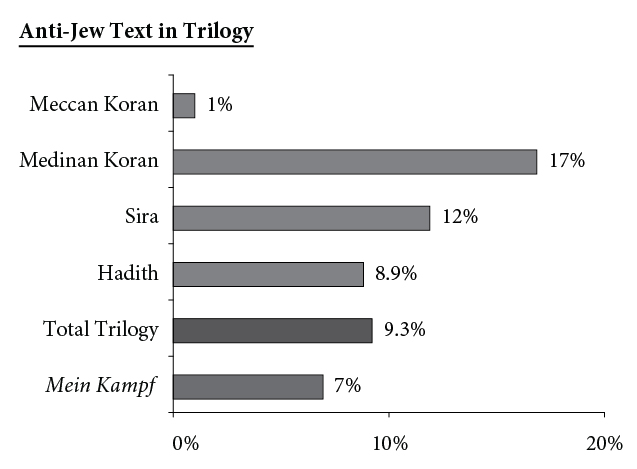
| Meccan
Koran |
960 |
0.99% |
| Medinan
Koran |
9282 |
16.9% |
| Total Koran |
10242 |
6.7% |
| Sira |
32,005 |
11.8% |
| Hadith |
57,563 |
8.9% |
| Total
|
99,810 |
|
| |
|
|
| Trilogy
Total |
1,069,064 |
|
| Grand Ratio |
9.3% |
Trilogy Text Devoted to
Jihad
The whole world must submit to Islam; Kafirs are the
enemy simply by not being Muslims. Violence and terror are made
sacred by the Koran. Peace comes only with submission to Islam.
Political Islam, jihad, is universal and eternal.
Jihad in the Medinan Koran (PDF)
Jihad in the total Koran (PDF)
Jihad in the Sira (PDF)
Jihad in the Hadith (PDF)
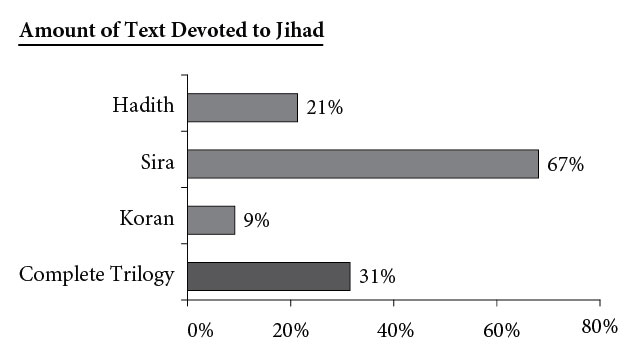
|
Meccan Koran |
0 |
0% |
|
Medinan Koran |
13,167 |
24% |
|
Total Koran |
13,167 |
8.7% |
|
Sira |
182,065 |
68% |
|
Hadith |
132,315 |
21% |
|
Total |
327,547 |
|
|
Trilogy total = 1,069,745 |
|
Grand Total: 31% |
The Status of Women in the
Koran
The major duality inside Islam is male/female. There is one set of
rules for men and another set of rules from women. If there were no
submission, then there would need to be only one rule: men and women
are treated the same. If they are not to be treated the same, then
many more rules are needed.
There is only one area in which men and women are treated equally —
both sexes will be judged on the basis of their lives on Judgment
Day, but when a woman is judged, she will be judged on how well she
obeyed her husband.
There is not very much material in the Trilogy about females. Only
about 9% of the Koran and about 12% of the Sira refers to females.
The overwhelming amount of the doctrine is about men. But there is
more than enough in the Trilogy to govern the smallest detail in the
life of a woman from birth to death.
Women positive references in the Koran (PDF)
Women and Men equal references in the Koran (PDF)
Women negative references in the Koran (PDF)
Women neutral references in the Koran (PDF)
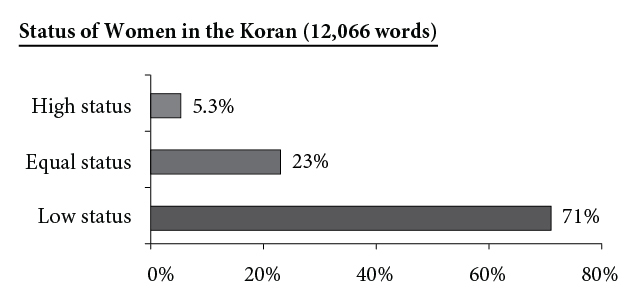
Statistics by Word Count
| Positive |
643 |
0.4% |
5.3% |
| Equal |
2,831 |
1.9% |
23.5% |
| Negative |
8,592 |
5.6% |
71.2% |
| Totals |
12,066 |
|
|
| |
|
|
|
| Neutral |
5,413 |
3.6% |
44.9% |
Statistics by Verse Count
| Positive |
11 |
7.3% |
| Equal |
38 |
25.2% |
| Negative |
102 |
67.5% |
| Totals |
151 |
|
| |
|
|
| Neutral |
74 |
|
The Status of Women in the
Hadith
The major duality inside Islam is male/female. There is one set of
rules for men and another set of rules from women. If there were no
submission, then there would need to be only one rule: men and women
are treated the same. If they are not to be treated the same, then
many more rules are needed.
There is only one area in which men and women are treated equally —
both sexes will be judged on the basis of their lives on Judgment
Day, but when a woman is judged, she will be judged on how well she
obeyed her husband.
There is not very much material in the Trilogy about females. Only
about 9% of the Koran and about 12% of the Sira refers to females.
The overwhelming amount of the doctrine is about men. But there is
more than enough in the Trilogy to govern the smallest detail in the
life of a woman from birth to death.
Women in the Hadith Low Status (PDF)
Women in the Hadith Equal Status (PDF)
Women in the Hadith High Status (PDF)
Women in the Hadith Neutral Status (PDF)
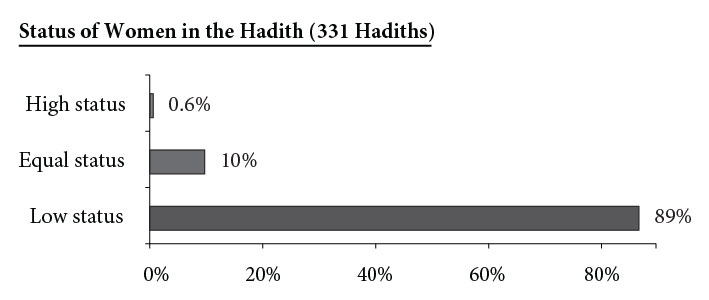
| Low |
45,580 |
296 |
89.4% |
| Equal |
3,509 |
33 |
10% |
| High |
62 |
2 |
.06% |
| Totals |
49,151 |
331 |
|
| |
|
|
|
| Neutral |
68,543 |
434 |
|
Greater Jihad
Islam claims that there is a “greater jihad” that is inner spiritual
struggle and that the killing jihad is the “lesser jihad”. How much
of the jihad literature is about the “greater jihad”?
Bukhari contains 645,745 words he devotes 132,315 words to jihad.
Below are all of the hadiths that refer to any religious practice as
being equal or better than jihad. These “better or equal to jihad”
verses are 2347 words, or 1.7% of all jihad hadiths (2347 / 132,315
= 0.017, 1.7%) are devoted to “better of equal to jihad”.
None of these use the phrase “greater jihad” but they do give
something more important than jihad or equal to it. Of course, other
hadiths say that jihad is the best.
Here is a typical jihad hadith. This shows that jihad is the best
deed, unlike some of the hadith below it. Ninety-eight percent (98%)
of all jihad hadiths call killing jihad (lesser jihad) the best
action.
Volume 3, Book 46, Number 694:
Narrated Abu Dhar
I asked the Prophet, "What is the best deed?" He replied, "To
believe in Allah and to fight for His Cause." I then asked, "What is
the best kind of manumission (of slaves)?" He replied, "The
manumission of the most expensive slave and the most beloved by his
master." I said, "If I cannot afford to do that?" He said, "Help the
weak or do good for a person who cannot work for himself." I said,
"If I cannot do that?" He said, "Refrain from harming others for
this will be regarded as a charitable deed for your own good."
“Greater Jihad” Hadiths
Volume 8, Book 73, Number 1
Narrated Al-Walid bin 'Aizar
I heard Abi Amr 'Ash-Shaibani saying, "The owner of this house." he
pointed to 'Abdullah's house, "said, 'I asked the Prophet 'Which
deed is loved most by Allah?" He replied, 'To offer prayers at their
early (very first) stated times.' " 'Abdullah asked, "What is the
next (in goodness)?" The Prophet said, "To be good and dutiful to
one's parents," 'Abdullah asked, "What is the next (in goodness)?"
The Prophet said, To participate in Jihad for Allah's Cause."
'Abdullah added, "The Prophet narrated to me these three things, and
if I had asked more, he would have told me more."
Volume 1, Book 2, Number 25
Allah's Apostle was asked, "What is the best deed?" He replied, "To
believe in Allah and His Apostle (Muhammad). The questioner then
asked, "What is the next (in goodness)? He replied, "To participate
in Jihad (religious fighting) in Allah's Cause." The questioner
again asked, "What is the next (in goodness)?" He replied, "To
perform Hajj (Pilgrim age to Mecca) 'Mubrur, (which is accepted by
Allah and is performed with the intention of seeking Allah's
pleasure only and not to show off and without committing a sin and
in accordance with the traditions of the Prophet)."
Volume 1, Book 10, Number 505
Narrated 'Abdullah
I asked the Prophet "Which deed is the dearest to Allah?" He
replied, "To offer the prayers at their early stated fixed times." I
asked, "What is the next (in goodness)?" He replied, "To be good and
dutiful to your parents" I again asked, "What is the next (in
goodness)? "He replied, 'To participate in Jihad (religious
fighting) in Allah's cause." 'Abdullah added, "I asked only that
much and if I had asked more, the Prophet would have told me more."
Volume 2, Book 15, Number 86
Narrated Ibn Abbas
The Prophet said, "No good deeds done on other days are superior to
those done on these (first ten days of Dhul Hijja)." Then some
companions of the Prophet said, "Not even Jihad?" He replied, "Not
even Jihad, except that of a man who does it by putting himself and
his property in danger (for Allah's sake) and does not return with
any of those things."
Volume 2, Book 26, Number 594
Narrated Abu Huraira
The Prophet was asked, "Which is the best deed?" He said, "To
believe in Allah and His Apostle." He was then asked, "Which is the
next (in goodness)?" He said, "To participate in Jihad in Allah's
Cause." He was then asked, "Which is the next?" He said, "To perform
Hajj-Mabrur. "
Volume 2, Book 26, Number 595
Narrated Aisha (the mother of the faithful believers)
I said, "O Allah's Apostle! We consider Jihad as the best deed." The
Prophet said, "The best Jihad (for women) is Hajj Mabrur. "
Volume 3, Book 29, Number 84
Narrated Aisha
I said, "O Allah's Apostle! Shouldn't we participate in Holy battles
and Jihad along with you?" He replied, "The best and the most
superior Jihad (for women) is Hajj which is accepted by Allah."
Aisha added: " Ever since I heard that from Allah's Apostle I have
determined not to miss Hajj."
Volume 4, Book 52, Number 41
Narrated Abdullah bin Masud
I asked Allah's Apostle, "O Allah's Apostle! What is the best deed?"
He replied, "To offer the prayers at their early stated fixed
times." I asked, "What is next in goodness?" He replied, "To be good
and dutiful to your parents." I further asked, what is next in
goodness?" He replied, "To participate in Jihad in Allah's Cause." I
did not ask Allah's Apostle anymore and if I had asked him more, he
would have told me more.
Volume 4, Book 52, Number 43
Narrated Aisha
(That she said), "O Allah's Apostle! We consider Jihad as the best
deed. Should we not fight in Allah's Cause?" He said, "The best
Jihad (for women) is Hajj-Mabrur (i.e. Hajj which is done according
to the Prophet's tradition and is accepted by Allah)."
Volume 4, Book 52, Number 127
Narrated 'Aisha (mother of the faithful believers)
I requested the Prophet permit me to participate in Jihad, but he
said, "Your Jihad is the performance of Hajj."
Volume 4, Book 52, Number 128
Narrated 'Aisha(mother of the faithful believers)
The Prophet was asked by his wives about the Jihad and he replied,
"The best Jihad (for you) is (the performance of) Hajj."
Volume 4, Book 52, Number 248
Narrated Abdullah bin 'Amr
A man came to the Prophet asking his permission to take part in
Jihad. The Prophet asked him, "Are your parents alive?" He replied
in the affirmative. The Prophet said to him, "Then exert yourself in
their service."
Volume 8, Book 73, Number 1
Narrated Al-Walid bin 'Aizar
I heard Abi Amr 'Ash-Shaibani saying, "The owner of this house." he
pointed to 'Abdullah's house, "said, 'I asked the Prophet 'Which
deed is loved most by Allah?" He replied, 'To offer prayers at their
early (very first) stated times.' " 'Abdullah asked, "What is the
next (in goodness)?" The Prophet said, "To be good and dutiful to
one's parents," 'Abdullah asked, "What is the next (in goodness)?"
The Prophet said, To participate in Jihad for Allah's Cause."
'Abdullah added, "The Prophet narrated to me these three things, and
if I had asked more, he would have told me more."
Volume 8, Book 73, Number 3
Narrated 'Abdullah bin 'Amr
A man said to the Prophet, "Shall I participate in Jihad?" The
Prophet said, "Are your parents living?" The man said, "Yes." the
Prophet said, "Do Jihad for their benefit."
Volume 9, Book 93, Number 625
Narrated Ibn Mas'ud
A man asked the Prophet "What deeds are the best?" The Prophet said:
(1) To perform the (daily compulsory) prayers at their (early)
stated fixed times, (2) To be good and dutiful to one's own parents.
(3) and to participate in Jihad in Allah's Cause."
Volume 1, Book 11, Number 624
Narrated Abu Huraira
Allah's Apostle said, "While a man was going on a way, he saw a
thorny branch and removed it from the way and Allah became pleased
by his action and forgave him for that." Then the Prophet said,
"Five are martyrs: One who dies of plague, one who dies of an
abdominal disease, one who dies of drowning, one who is buried alive
(and) dies and one who is killed in Allah's cause." (The Prophet
further said, "If the people knew the reward for pronouncing the
Adhan and for standing in the first row (in the congregational
prayer) and found no other way to get it except by drawing lots they
would do so, and if they knew the reward of offering the Zuhr prayer
early (in its stated time), they would race for it and they knew the
reward for 'Isha' and Fajr prayers in congregation, they would
attend them even if they were to crawl')
Volume 2, Book 13, Number 6
Narrated Abu Huraira
Allah's Apostle (p.b.u.h) said, "Any person who takes a bath on
Friday like the bath of Janaba and then goes for the prayer (in the
first hour i.e. early), it is as if he had sacrificed a camel (in
Allah's cause); and whoever goes in the second hour it is as if he
had sacrificed a cow; and whoever goes in the third hour, then it is
as if he had sacrificed a horned ram; and if one goes in the fourth
hour, then it is as if he had sacrificed a hen; and whoever goes in
the fifth hour then it is as if he had offered an egg. When the Imam
comes out (i.e. starts delivering the Khutba), the angels present
themselves to listen to the Khutba."
Volume 2, Book 24, Number 504
Narrated Abu Huraira
The Prophet (p.b.u.h) said, "Seven people will be shaded by Allah
under His shade on the day when there will be no shade except His.
They are:
(1) a just ruler;
(2) a young man who has been brought up in the worship of Allah,
(i.e. worship Allah (Alone) sincerely from his childhood),
(3) a man whose heart is attached to the mosque (who offers the five
compulsory congregational prayers in the mosque);
(4) two persons who love each other only for Allah's sake and they
meet and part in Allah's cause only;
(5) a man who refuses the call of a charming woman of noble birth
for an illegal sexual intercourse with her and says: I am afraid of
Allah;
(6) a person who practices charity so secretly that his left hand
does not know what his right hand has given (i.e. nobody knows how
much he has given in charity).
(7) a person who remembers Allah in seclusion and his eyes get
flooded with tears."
Volume 7, Book 64, Number 265
Narrated Abu Huraira
The Prophet said, "The one who looks after a widow or a poor person
is like a Mujahid (warrior) who fights for Allah's Cause, or like
him who performs prayers all the night and fasts all the day."
Volume 7, Book 69, Number 515
Narrated Anas bin Malik
Abu Talha had the largest number of datepalms from amongst the
Ansars of Medina. The dearest of his property to him was Bairuha
garden which was facing the (Prophet's) Mosque. Allah's Apostle used
to enter it and drink of its good fresh water. When the Holy
Verse:-- 'By no means shall you attain righteousness unless you
spend (in charity) of that which you love.' (3.92) was revealed, Abu
Talha got up and said, "O Allah's Apostle! Allah says: By no means
shall you attain righteousness unless you spend of that which you
love,' and the dearest of my property to me is the Bairuha garden
and I want to give it in charity in Allah's Cause, seeking to be
rewarded by Allah for that. So you can spend it, O Allah's Apostle,
where-ever Allah instructs you. ' Allah s Apostle said, "Good! That
is a perishable (or profitable) wealth" ('Abdullah is in doubt as to
which word was used.) He said, "I have heard what you have said but
in my opinion you'd better give it to your kith and kin." On that
Abu Talha said, "I will do so, O Allah's Apostle!" Abu Talha
distributed that garden among his kith and kin and cousins.
Volume 8, Book 73, Number 35
Narrated Safwan bin Salim
The Prophet said "The one who looks after and works for a widow and
for a poor person, is like a warrior fighting for Allah's Cause or
like a person who fasts during the day and prays all the night."
Narrated Abu Huraira that the Prophet said as above.
Volume 8, Book 73, Number 36
Narrated Abu Huraira
Allah's Apostle said, "The one who looks after and works for a widow
and for a poor person is like a warrior fighting for Allah's Cause."
(The narrator Al-Qa'nabi is not sure whether he also said "Like the
one who prays all the night without slackness and fasts continuously
and never breaks his fast.")
Volume 8, Book 76, Number 501
Narrated Abu Sa'id Al-Khudri
A bedouin came to the Prophet and said, "O Allah's Apostle! Who is
the best of mankind!" The Prophet said, "A man who strives for
Allah's Cause with his life and property, and also a man who lives
(all alone) in a mountain path among the mountain paths to worship
his Lord and save the people from his evil."
Volume 8, Book 82, Number 840
Narrated Abu Huraira
The Prophet said, "Avoid the seven great destructive sins." They
(the people!) asked, "O Allah's Apostle! What are they?" He said,
"To join partners in worship with Allah; to practice sorcery; to
kill the life which Allah has forbidden except for a just cause
(according to Islamic law); to eat up usury (Riba), to eat up the
property of an orphan; to give one's back to the enemy and freeing
from the battle-field at the time of fighting and to accuse chaste
women who never even think of anything touching chastity and are
good believers."
Volume 4, Book 52, Number 250
Narrated Ibn Abbas
That he heard the Prophet saying, "It is not permissible for a man
to be alone with a woman, and no lady should travel except with a
Muhram (i.e. her husband or a person whom she cannot marry in any
case for ever; e.g. her father, brother, etc.)." Then a man got up
and said, "O Allah's Apostle! I have enlisted in the army for
such-and-such Ghazwa and my wife is proceeding for Hajj." Allah's
Apostle said, "Go, and perform the Hajj with your wife."
Volume 4, Book 52, Number 295
Narrated Ibn 'Abbas
A man came to the Prophet and said, "O Allah's Apostle! I have
enlisted in the army for such-and-such Ghazwa, and my wife is
leaving for Hajj." Allah's Apostle said, "Go back and perform Hajj
with your wife."
Jihad references in the Hadith (PDF)
The meaning of “brother” in Islam
The word brother is used in two ways in Bukhari. The first meaning
is an actual blood brother, sharing the same mother or father. The
second meaning is another Muslim.
There are a total of 209 hadiths that refer to the word “brother”
and of these 96 refer to being a blood brother. This leaves 209 – 96
= 113 hadiths about spiritual brotherhood.
This work is important since it means that pseudo-Golden Rule
hadiths that say a Muslim is to love his brother does not apply to
kafirs. Hence, the hadith is not a true Golden Rule, which is to
treat ALL others as a brother. The kafir is outside the
pseudo-Golden Rule. In Islam the Golden Rule is restricted to other
Muslims.
Hadith references to Muslim Brothers (PDF)
Hadith references to Muslim Blood Brothers (PDF)
The Sunna of Mohammed
The Number of Times the Koran Commands Muslims to Imitate Mohammed
The Koran demands 91 times that Muslims imitate Mohammed in every
way. These commands take two types—historical and the other is a
direct command. The Meccan Koran is filled with examples of the
previous “prophet/messengers” who had to be obeyed or Allah punished
them. Moses is a historical example. There are only 5 direct
commands to follow Mohammed in Mecca.
Then in Medina there are 84 verses with a direct command to obey and
follow Mohammed. Why the increase? In Medina Mohammed was a
political leader and needed total command in this world, not the
next.
Koran demands 91 times that Muslims imitate Mohammed (PDF)
The 26 versions of the Koran
There are at least 26 different Arabic Korans (Qur'ans), that have
been
found, and which exist in the Arab world today (2016), and all include
slight changes from one to the other.
Between the 2 most popular versions, the Hafs and Warsh Korans
(Qur'ans), there are over 1,000 differences. When comparing to the other 24
it is found over 5,000
different changes. The
Coptic Question
The issue of the native Egyptians which are the Christians Copts in
Egypt under the rule of the Arab Muslim invaders 642 AD.
Copts and Muslims under British control a collection of facts and a
résumé of authoritative opinions on the Coptic question (PDF)
The Arab Conquest of Egypt And the Last Thirty Years of the Roman
Dominion (PDF)
Muslim Conquests in North Africa (PDF)
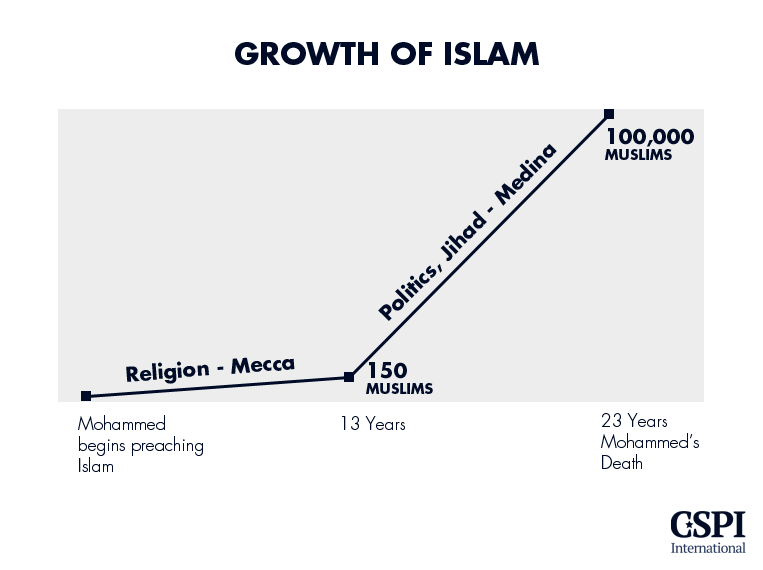
In Mecca Mohammed was a religious
preacher who converted about 10 people a year to Islam. In Medina
Mohammed was a warrior and politician who converted about 10,000
people to Islam every year. Politics and jihad were a thousand times
more effective than religion to convert the Arabs to Islam. If
Mohammed had not taken to politics and jihad, there would have only
been a few hundred Muslims when he died and Islam would have failed.
The religion of Islam was a failure, but politics and war (jihad)
combined with religion was a total success. The graphic clearly
shows the difference in the growth of Islam during its two phases.
The Enemy In Our Ranks
German police trainer blasts immigrant recruits in leaked audio
message
In a leaked recording from the
Berlin Police Academy, a lecturer bemoaned the poor language skills,
lack of respect, and disloyalty of ethnic Turks and Arabs who will
form a sizeable part of the next generation of German police
officers.
The audio message was recorded by a paramedic lecturer, who intended
to pass it on to Berlin Police chief Klaus Kandt. It was
subsequently circulated in private chats between officers on a
messaging app last week, and has now been shared with RT. Police
officials have previously confirmed that the recording is authentic
to several German media, but have not disclosed the identity of the
tape’s author. In the voice message, the lecturer
complains about a class of 16 and 17 year-old recruits, who are just
beginning their vocational training.
“I’ve never experienced anything like this, the classroom looked
like hell, half Arabs and Turks, disrespectful as hell. Stupid.
Unable to speak articulately. I had been close to knocking out 2 or
3 of them
because they only disturbed the class or literally slept. German
colleagues have said that they were threatened with violence.” - the
words of the German police trainer on the minute-long recording.
The “shocked” lecturer reported that he had “never felt such
hostility before” and believed that many of the trainers are scared
to discipline the students as “they will trash the place.”
About 1,200 students graduate from the academy in Spandau, Germany
each year, most of whom proceed to join the Berlin police force,
which already consists of 30% ethnic minorities. This number is expected to
increase, reflecting demographic trends in Germany.
“These are not colleagues, that’s the enemy in our ranks,” the
paramedic lecturer said in the message for Kandt, complaining that
the recruits will produce “a second-rate police force that will only
be corrupt.” - in RT News, 2 November 2017.
The European Union
lost €180 billion (USD $210 billion) in GDP due to
terrorism between 2004 and 2016. The United Kingdom
(€43.7 billion) and France (€43 billion) suffered
the highest losses, followed by Spain (€40.8
billion) and Germany (€19.2 billion), according to a
Rand Corporation study.
"Beyond those
who have been directly physically affected by
terrorist attacks, the extensive coverage of
terrorist attacks through multiple media and
social media channels has substantially
increased the amount of people and companies
that could be psychologically affected. This
subsequently affects their economic behaviour".
New
statistics have also come from the Britain's
anti-terrorism office.
441 people have been arrested in the UK for
terrorism in the last year alone, and 4,182 since
the attacks of September 11, 2001. The threat of
terrorism is exhausting Europe.
According to the
Spanish "black
book" of terrorism, 658 Europeans have been
murdered in terror attacks on European soil, while
1,029 Europeans have been killed by them abroad.
Half of the French army has been deployed within
the French Republic to protect the civilian targets,
such as schools, monuments, and religious sites.
Europe's armies are exhausted from patrolling the
streets, to the point that
NATO planners now fear that, over time, European
armies "may get better at guarding railway stations
and airports than fighting wars". An officer who
recently returned from Afghanistan for guard duty in
Belgium
said: "We are standing around like flowers pots,
just waiting to be smashed".
Germany also sent troops into the streets for
the first time since the Second World War.
One has to ask: Is
Europe really serious about its war on terror? The
French magazine Causeur just called it "the
Batman Syndrome":
"How can we
respect a society that is too cowardly to fight
those who threaten its citizens, and that
demonstrates its weakness by systematically
seeking appeasement at the price of the most
unreasonable accommodations? It is the 'Batman
syndrome': the hero refuses to kill, he
systematically saves his enemy who escapes and
kills new victims until the hero catches up with
him, and so on."
France is now close
to freeing at least
50 terrorists from prison. The
UK is also due to free 80 Islamic
fundamentalists from prison. According to a
new French report, nearly 10% of the 512
prisoners incarcerated for terrorism are likely to
be released by the end of 2018. Their release may
well pose a major threat.
Khamzat Azimov, a terrorist who stabbed a man to
death and injured four other people with a knife in
central Paris, was known to counter-terrorism
forces.
Belgium released from prison a terrorist who had
gone on a "bloody rampage" in the city of Liege two
days before he killed two policewomen and a
passerby.
Unless it gets
serious about arresting not only the terrorists but
also their deadly ideology, Europe will not see the
end of the jihadist siege. A few days after the
attacks in Liege, France thwarted another jihadist
plot "with either explosives or ricin, this very
powerful poison". After that, there was another
terror attempt to strike the
French gay community.
"France is the
priority target of the terrorism unleashed in Europe
by conquering Islam" wrote Ivan Rioufol in
Le Figaro.
"Since 2015,
247 people have been killed in France in attacks
by Islamists. The 'knife intifada' is no longer
reserved just for Israel. In Magnanville, a
couple of policemen, Jean-Baptiste Salvaing and
Jessica Schneider, were stabbed in front of
their 3 year-old child. Father Jacques Hamel
was slaughtered in his church. In Marseille,
Laura and Maurane had their throats slashed.
These crimes will continue so long as the
Republic leaves the enemy in peace".
The level of threat
in France remains alarmingly high. "9,157 people
were subjected to at least one surveillance measure
by the intelligence services in 2017 in the name of
the prevention of terrorism", an official French
report recently revealed. In 2017,
20 major terror attacks in France were foiled.
Regarding the
West's current "war on terror," American historian
Victor Davis Hanson
wrote:
"The result is
the present age of serial Punic conflict,
perhaps intolerable to the psyche, but in amoral
terms tolerable as long as casualties are kept
to a minimum and defeat is redefined as
acceptable strategic wisdom. In the past, such
periods of enervating war have gone on for a
century and more. Ultimately, they too end — and
with consequences."
In the end, there
might be still a region called "Europe", but it may
no longer enfold European culture." - Giulio Meotti,
Cultural Editor for "Il Foglio", Italian
journalist and author. © 2018 Gatestone
Institute
The Turkish regime
funded Directorate of Religious Affairs (Diyanet)
published in July 2018 a
detailed report, which stated that Islam is
"superior" to Judaism and Christianity, and that
"interfaith dialogue is unacceptable."
The report concludes:
"Islam is the last divine religion sent to the entire
humanity. All of the former religions lost their
validity when Prophet Mohammed, the last pearl of the
sequence of prophets, was sent as a prophet and the
Koran was sent as the last divine book. Hence, according
to Islam, it is unacceptable to evaluate Islam on the
same level as Judaism and Christianity and to engage in
'interfaith dialogue' by saying that former religions
continue to be 'true religions.' To bring Islam, the
last and only true religion, next to other religions
does not comply with Islam's uniqueness and superiority
in the eyes of Allah."

"And We sent, following in
their footsteps, Jesus, the son of Mary, confirming that
which came before him in the Torah; and We gave him the
Gospel, in which was guidance and light and confirming
that which preceded it of the Torah as guidance and
instruction for the righteous." - Quran:
46 verse of chapter 5 (sūrat l-māidah), Sahih
International
|










